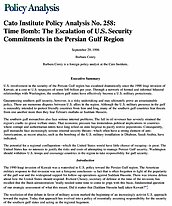U.S. involvement in the security of the Persian Gulf region has escalated dramatically since the 1990 Iraqi invasion of Kuwait, at a cost to U.S. taxpayers of some $40 billion per year. Through a network of formal and informal bilateral relationships with Washington, the southern gulf states have effectively become a U.S. military protectorate.
Guaranteeing southern gulf security, however, is a risky undertaking and may ultimately prove an unsustainable policy. There are numerous disputes between U.S. allies in the region. Although the U.S. military presence in the gulf is ostensibly intended to protect friendly countries from Iran and Iraq, many of the southern gulf countries fear threats from one another more than they fear Tehran’s mullahs or Saddam Hussein.
The southern gulf monarchies also face serious internal problems. The fall in oil revenues has severely strained the region’s cradle-to-grave welfare states. That economic pressure has tremendous political implications in countries where corrupt and authoritarian rulers have long relied on state largesse to pacify restive populations. Consequently, gulf monarchs face increasingly serious internal security threats–which often have a strong element of anti-Americanism, as recent attacks, such as the bombing of the U.S. military installation in Dhahran, Saudi Arabia, have indicated.
The potential for a regional conflagration–which the United States would have little chance of escaping–is great. The United States has no interests to justify the risks and costs of attempting to manage Persian Gulf security. Washington should withdraw U.S. troops and encourage countries in the region to take responsibility for gulf security.

This work is licensed under a Creative Commons Attribution-NonCommercial-ShareAlike 4.0 International License.
